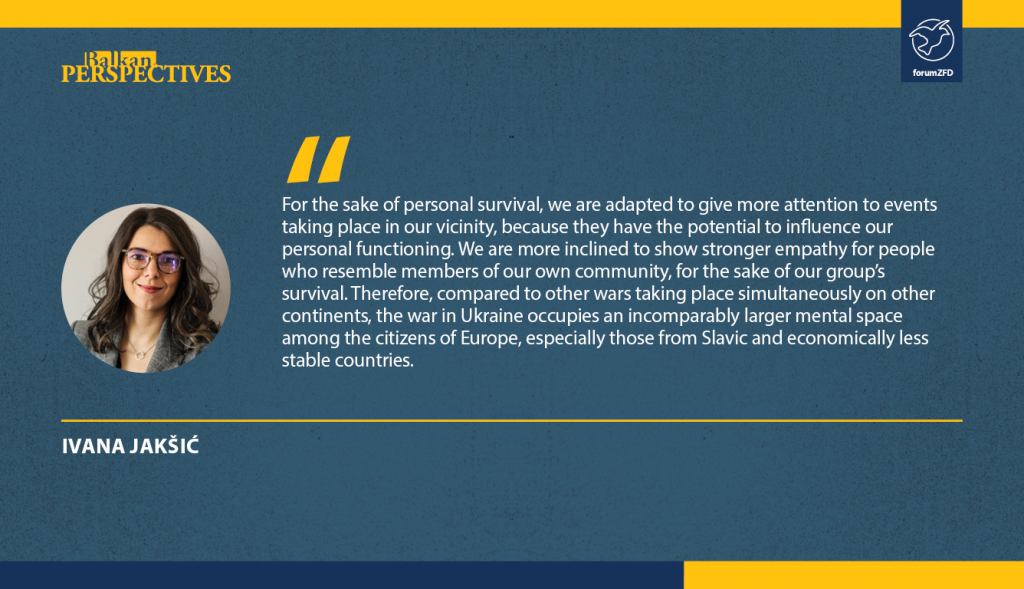News of collective negative events, such as wars, very easily find their way into our inner world. Apart from the fact that such events get meticulous coverage in the global media context, evolution has wired us to pay more attention to negative news than positive ones, because they have greater information value for our survival. From the viewpoint of civilization values of humanism and solidarity, the wars in Yemen and Ukraine deserve the same global attention and support in the search for peace. Yet, on an individual level, the cognitive apparatus through which we comprehend and interpret social information to then decide how to navigate the social reality still functions with the help of mechanisms developed during an earlier evolutionary past. For the sake of personal survival, we are adapted to give more attention to events taking place in our vicinity, because they have the potential to influence our personal functioning. We are more inclined to show stronger empathy for people who resemble members of our own community, for the sake of our group’s survival. Therefore, compared to other wars taking place simultaneously on other continents, the war in Ukraine occupies an incomparably larger mental space among the citizens of Europe, especially those from Slavic and economically less stable countries. As creating and understanding social information involves connecting with existing knowledge and previous experiences, the people of the Balkans are thus placed in an even more specific position. Apart from group similarities, the immediate proximity, and fear of an economic crisis, the personal experiences and/or collective knowledge about the Yugoslav wars from the ‘90s, as well as a fragile and unfinished process of reconciliation, become a more relevant context and are key for interpreting the current events in Ukraine.

Connecting new information with adopted – and especially personal experiences – is a very significant and efficient psychological mechanism which allows us to successfully manoeuvre through social reality. Under similar circumstances we apply the patterns which previously helped us survive, and thus preserve our mental energy and increase the probability of success. Problems in social-psychological functioning can arise in two cases: 1) when a new situation resembles a previous one, but learned patterns are not completely applicable and stop being adaptive, 2) when new information evokes similar experiences from the past, but these memories are emotionally so strongly negative that they are never fully conceived and translated into a form in which they become useful guidelines for future actions. Among the citizens of the Balkans, the war in Ukraine has the potential to activate one of the two described patterns, or both at the same time. In both cases, emotions are a significant guide for understanding individual experiences and interpreting the collective behaviour. News about the coming economic crisis, shortages, and inflation can trigger among the Balkan citizens memories of similar experiences from the 1990s, evoking emotions of concern, fear, and anxiety that are inconsistent with current circumstances or the magnitude of the threat. They may resort to the same strategies which helped them overcome unfavourable circumstances in the past, even though they may be neither efficient, nor justified in this new situation. An example of such a strategy is stockpiling essential groceries. Not only can disproportionate feelings lead to inappropriate actions, they can also drain existing mental capacities. For people who have other risk factors, this can lead to more serious mental health problems, while even for people who are not at risk, unjustified use of cognitive resources reduces the willingness to engage in full capacity in meaningful activities that contribute to their quality of life (rest, socializing, etc.).
For a significant number of Balkans citizens, the war in Ukraine has reactivated a collective trauma of the Yugoslav wars, from the civil wars in Bosnia and Herzegovina, Croatia and Kosovo, to the NATO bombing of the Federal Republic of Yugoslavia in 1999. Collective trauma differs from individual trauma because an entire group participates in an event or series of events at a certain time, which creates a strong negative emotional experience. Similar to individual trauma, the traumatic experience enters the mental space, occupies a significant part of it and continues to influence a person’s behaviour. In the face of stimuli reminiscent of a traumatic event, negative, post-traumatic stress reactions are activated. Individuals rarely have the capacity to cope with a traumatic experience on their own, and even with social support it is a challenging process. That is why they rely on different coping strategies, which mostly just numb the traumatic experience, like ignoring, denying, reducing the importance, or turning to psychoactive substances. Some also look for positive meanings, believing that the traumatic experience has made them more resilient and adaptable. The news from Ukraine have awoken old feelings of unease and anxiety among many people in the Balkans, which they were perhaps unable to even connect with their personal experience of the war, and perhaps they dealt with them in tried ways that eliminate negative feelings for a short time. Avoiding personal negative feelings could have made them less sensitive to the problems of those who are currently losing their lives and in need of support. Still, the only way to overcome trauma is to face it – to recognize our own traumatic experience, talk about it, and think about it. When we give significance to such an experience it stops being an unbearable undefined negative content draining our mental energy and preventing our personal growth and development. The traumatic experience which is thought about becomes knowledge which can inform future actions in a purposeful way.
For some, the news from Ukraine could be an opportunity to speak about their own trauma for the first time, from a safe distance and secure position, and finally overcome it. Unfortunately, the politics of reconciliation in the Balkans so far have not done enough to promote the importance of speaking about personal experiences from the war. Understanding the psychological processes which the war in Ukraine could have triggered among the citizens of the Balkans additionally indicates the importance of such politics. Also, responsible leadership in the current crisis caused by the war in Ukraine should have been informed by other described psychological processes, in order to prevent inadequate social actions and mental health problems.
Ivana Jakšić, PhD, is an Assistant Professor in social and political psychology at the Faculty of Political Sciences at the University of Belgrade. Her research interests include socio-psychological factors and mechanisms affecting social equality, social psychology of gender relations and implicit social cognition. As a researcher or data manager she participated in several national and international socio-psychological research projects.




